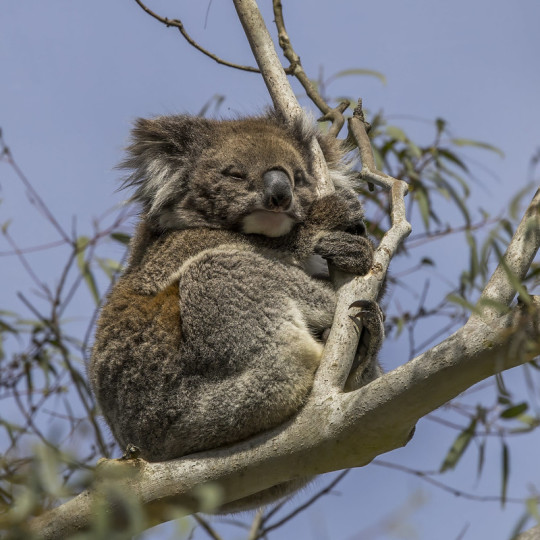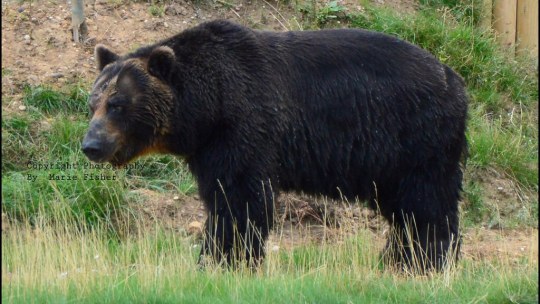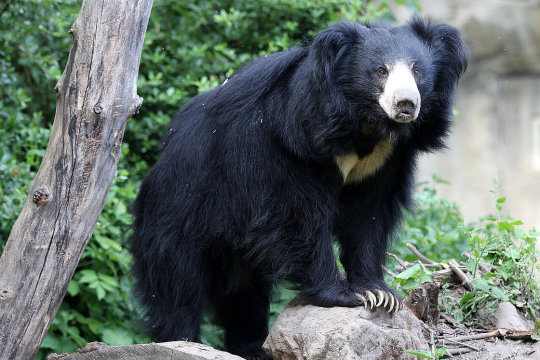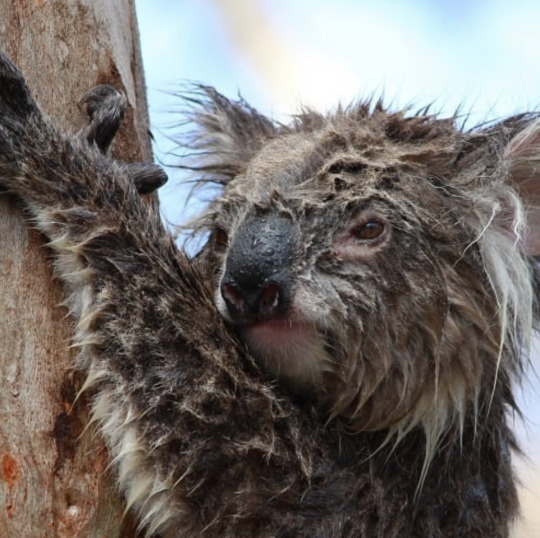#Phascolarctos
Explore tagged Tumblr posts
Text

A koala (Phascolarctos cinereus) in Mount Lofty, Australia
by Charles Sharp
#koala#marsupials#phascolarctos cinereus#phascolarctos#Phascolarctidae#diprotodontia#marsupialia#mammalia#chordata#wildlife: australia#wildlife: oceania
374 notes
·
View notes
Text
#2794 - Phascolarctos cinereus - Koala

Another exercise in disturbing taxidermy from the Victorian-style animal exhibit at the Otago Museum - what the hell did they do to his ears? and his nose? They don't even seem to have got the famous two thumbs right.

(Photo by JJ Harrison, again)
They don't even have the excuse that it's a juvenile, the ears are big and fluffy on them too. *sigh*
Of course it did take a while for Koalas to become so popular that they earn Australia a billion dollars a year in tourist money - some of the earliest reports and descriptions of the animal weren't actually published until a century or so later. And the descriptions that did came out weren't exactly flattering. See George Perry in 1810, for example.
"a clumsy awkward appearance, and void of elegance in the combination … they have little either in their character or appearance to interest the Naturalist or Philosopher. As Nature however provides nothing in vain, we may suppose that even these torpid, senseless creatures are wisely intended to fill up one of the great links of the chain of animated nature"

Rude. Others described it as having a "fierce and menacing look". I have to wonder if they even saw the animal.
The binomial means 'Ash-coloured pouched bear". Synonyms include Lipurus cinereus, Marodactylus cinereus, Phascolarctos fuscus, Phascolarctos flindersii, Phascolarctos koala and Koala subiens. "Koala" comes from the Dharug-language word gula, meaning 'no water', because, famously, they don't come down from the trees to drink.
The last remaining member of the family Phascolarctidae, and probably quite pleased that their only food supply, Eucalyptus leaves, was suddenly much more abundant as the continent dried out and most of the rainforests Went Away. That said, they used to have a much wider range than they now do - they're long extinct in Western Australia, and their remaining populations in the east and south east are under threat from logging, land clearing, vehicle collisions, increasing bushfires, chlamydia and immune deficiency caused by the Koala Retrovirus, dog attack, and assholes with guns. Dehydration and overheating can prove fatal, so global warming is yet another threat.
Males can reach lengths of 85cm (24–33 in) and a weight of 4–15 kg. Anatomical peculiarities include the vestigial tail, enormous appendix, tiny nearly smooth brain (they can't even recognise gum leaves on a flat surface as food), the first and second finger on the forepaws being opposable to the other three, and the second and third toe on the hind foot fused into a two-claw fur comb (although that last feature in widespread in the Order Diprotodontia). The digestion is evolved to deal with a highly poisonous, barely nutritious diet, and the general lack of drinking water 50 feet above the ground.
Males attract mates and intimidate rivals with remarkably deep bellowing, but koalas can also snarl, wail, scream, squeak and squawk. Males will also mark their territory with chemicals from their chest patch and in their urine.
Ovulation is induced by mating (frequently after the female has watched the local males beat the crap out of each other) and the joeys stay near mum until they're 18 months to two years old.
Otago Museum, Dunedin, Aotearoa New Zealand.
#Otago Museum#Dunedin#Phascolarctos#Phascolarctidae#koala#marsupial#koala bear#bad taxidermy#Dunedin NZ
1 note
·
View note
Text



食み食みかわいい〜って思った後、隣の方の寝姿わろた
多摩動物公園
A tree can be their buffet or their bed.
Tama Zoological Park
118 notes
·
View notes
Text
The latter may be due to the infant Koala's habit of eating its mother's feces directly from her anus during weaning, since she produces a special form of excrement known as PAP especially for feeding her young (this practice is also found in a number of other marsupials).
"Biological Exuberance: Animal Homosexuality and Natural Diversity" - Bruce Bagemihl
#book quote#biological exuberance#bruce bagemihl#nonfiction#koala#phascolarctos cinereus#chlamydia#sti transmission#weaning#pap#marsupial
3 notes
·
View notes
Text
Female Koalas in heat sometimes mount each other in the trees: while one female clings vertically to the trunk, another climbs behind her and reaches around to simultaneously hold on to the tree.

"Biological Exuberance: Animal Homosexuality and Natural Diversity" - Bruce Bagemihl
#book quotes#biological exuberance#bruce bagemihl#nonfiction#koala#phascolarctos cinereus#in heat#mounting#trees
0 notes
Text
Koalas that participate in homosexual mounting are probably bisexual, since females that mount other females have also been observed mating with males.
"Biological Exuberance: Animal Homosexuality and Natural Diversity" - Bruce Bagemihl
#book quote#biological exuberance#bruce bagemihl#nonfiction#koala#phascolarctos cinereus#bisexual#mounting
0 notes
Text

Sundays are for snoozing… just ask a koala (Phascolarctos cinereus). This critter can sleep as much as 20 hours per day! Koalas inhabit Australian forests and woodlands that are abundant in eucalyptus trees—eucalyptus leaves make up the majority of this marsupial’s diet.
Photo: Tim Dawson, CC BY-SA 2.0, flickr
#science#nature#natural history#animals#fact of the day#did you know#koala#animal facts#sundays#cute animals#fun facts#australia
524 notes
·
View notes
Text
THE MARAUDERS CHARACTERS AS NATIVE AUSTRALIAN ANIMALS
(i apologise if an animal you like isn't here or if you disagree, these were just ones that i knew and thought fit best) !!! special thanks to my sister @professor-geen-berries for helping me choose :] !!!
james - common wombat (vombatus ursinus)

sirius - red-tailed black cockatoo (calyptorhynchus banksii)

remus - brush-tailed rock-wallaby (petrogale penicillata)

peter - crest-tailed mulgara (dasycercus cristicauda)

lily - superb fairywren (malurus cyaneus)

mary - short-beaked echidna (tachyglossus aculeatus)

marlene - sugar glider (petaurus breviceps)

emma - superb lyrebird (menura novaehollandiae)

emmeline - platypus (ornithorhynchus anatinus)

dorcas - diamond python (morelia spilota)

pandora - blue-ringed octopus (hapalochlaena maculosa)

evan - freshwater crocodile (crocodylus johnstoni)

barty - tasmanian devil (sarcophilus harrisii)

regulus - fairy penguin (eudyptula minor)

alice - koala (phascolarctos cinereus)

frank - greater bilby (macrotis lagotis)

special mention obscure characters :]
florean fortescue - eastern quoll (dasyurus viverrinus)

august ollivander - green stream frog (litoria phyllochroa)

#marauders#marauders fandom#the marauders fandom#australia#australian animals#australian fauna#james potter#sirius black#remus lupin#peter pettigrew#lily evans#mary macdonald#marlene mckinnon#emma vanity#emmeline vance#dorcas meadowes#pandora rosier#pandora lovegood#evan rosier#barty crouch jr#barty crouch junior#regulus black#alice fortescue#frank longbottom#florean fortescue#august ollivander#marauders headcanons#animagus#patronus
38 notes
·
View notes
Photo

🐨 Did you hear?! BHL-Australia portal just released. C pg on famous Australian marsupial Phascolarctos cinereus #bhlpod
28 notes
·
View notes
Text
CoD Baddies as Bears!
What if the bad guys were also bears! Part 3
See part 2 and 1 for 141 and good guys as bears
Even more bear facts because bears are love, bears are life. 🐻🐻❄️🧬
Makarov: Ussuri Brown Bear "Russian Grizzly Bear"
Ursus arctos lasiotus

Also known as the Ezo Brown bear or Black Grizzly bear, this subspecies of Eurasian Brown Bear is one of the largest, with some individuals approaching the Kodiak Bear in size.
Similar to the Kamchatka Brown Bear, it differs with an elongated skull, longer nasal bones, elevated forehead and is darker in colour with some individuals being pure black.
Siberian (Amur) tigers and other bears are it's only natural predators, with documented tiger and bear interspecific competitions. Ussuri brown bears will often scavenge tiger kills and or kill smaller tigers, while Tigers are known to hunt young and sub-adult bears (bears making a significant portion of their diet).
Graves: Louisiana Black Bear
Ursus americanus luteolus

A subspecies* of the American Black Bear (U. a. americanus), the Louisiana Black Bear has been historically found in Louisiana, Mississippi, East Texas and Arkansas.
It is not substantially different from the American Black Bear, though it has a longer, flatter, narrower skull and larger molars in comparison. It's colouration is typically black, though some individuals have been known to be brown/red-brown cinnamon. It is Louisiana's official state mammal.
*The validity of this subspecies has been repeatedly debated.
Valeria: Sloth Bear "Indian Bear"
Melursus ursinus

A native species to the Indian Subcontinent, this medium sized bear feeds on ants, termites and fruit. It is also called the "labiated bear" due to its long lower lip and palate which is used to eat insects.
It's fur is pure black aside from the white "Y" or "V" patch on its chest though this can be absent in some individuals. They are similar in size with the Asian Black Bear though distinguished with it's shaggy mane, white 'sickle' claws, and rangier build.
This species is the most aggressive to humans with the largest number of recorded attacks due to a combination of close human cohabitation and a theorised predisposition to aggressive behaviour from constant attacks by tigers, leopards, rhinos and elephants.
Captain Williamson in his Oriental Field Sports (1819) wrote of how sloth bears rarely killed their human victims outright, but would suck and chew on their limbs till they were reduced to bloody pulps.
They are not known to be man eaters despite attacking humans. One individual in Mysore (Mysuru), India was recorded to have killed at least 12 people and mutilated 24 before it's death in 1957.
Shepherd: Koala "Koala Bear"**
Phascolarctos cinereus

**not a bear
An arboreal marsupial native to Australia that feeds primarily on Eucalyptus leaves. Koalas are asocial with bonding only taking place between mothers and dependant offspring. They are largely sedentary and will sleep upwards to 20 hours a day.
The word "koala" came from the Dharug word "gula" - no water. The 'u' sound was originally written phonetically as 'oo' and then became 'oa'. The three syllable pronunciation may be erroneous as a result.
White settlers adopted the 'koala' indigenous loan word in reference to the animal, where it was also referred to as, the "native bear", or the "koala bear" due to its supposed bear-ish resemblance.
+
Info from Wikipedia. Please let me know if I screwed up somewhere. 🐻
#cod mwiii#cod mwii#call of duty modern warfare#call of duty#vladimir makarov#cod makarov#phillip graves#graves cod#valeria garza#valeria mw2#general shepherd#bears#bear facts#cod mw2#cod mw3
49 notes
·
View notes
Text

Koala (Phascolarctos cinereus)
Habitat & Distribution
Found mainly in eucalyptus forests; in drier regions they stay near sources of water
Ranges throughout eastern and southern Australia
Physical Description
Weight: 4–15 kg (9–33 lb)
Length: 60–85 cm (24–33 in)
Koalas are grey, with lighter underbellies; both the body and the head are round
The front feet have three fingers and two opposable thumbs; the hind feet have one opposable thumb and four fingers, two of which are fused together
Behaviour
Koalas are herbivorous, and spend most of their time foraging in eucalyptus trees
When not foraging, individuals spend most of their time sleeping
This species is largely social; females may congregate in small groups, but there is no set hierarchy or communal behaviour
Common predators include goannnas, dingos, pythons, and birds of prey
Key Advantages
When frightened, koalas can run up to 32 kph (19 mph) and climb trees in 2 m (6.5 ft) bounds
They are good climbers, and their unique hands give them a strong grip
In a pinch, koalas have sharp teeth that pack a painful bite
See where they stand in the May Mammal Madness Tournament here!
Photo by Greta Frankham
42 notes
·
View notes
Text
For #SaveTheKoalaDay 🐨:

T.S. Busby, "Koalo," plate in George Perry's Arcana, 1810-11. First published image of a Koala (Phascolarctos cinereus).
That face…

#animals in art#animal holiday#european art#illustration#19th century art#koala#Save the Koala Day#marsupial#natural history art#scientific illustration#lithograph#book plate#National Library of Australia#Australian animals#Australian wildlife
80 notes
·
View notes
Text

Koala (Phascolarctos cinereus)
5 notes
·
View notes
Text

🟪 ANIMAL OF THE DAY: koala. Phascolarctos cinereus. the Australian mammal everyone knows. but did you know that it is a MARSUPIAL? that means it has a pouch. possibly illegally. who knows what is in There.
happy Wild Koala Day to these hooligans
40 notes
·
View notes
Text
Koalas that participate in homosexual mounting are probably bisexual, since females that mount other females have also been observed mating with males.
"Biological Exuberance: Animal Homosexuality and Natural Diversity" - Bruce Bagemihl
#book quote#biological exuberance#bruce bagemihl#nonfiction#koala#phascolarctos cinereus#mounting#bisexual#homosexual
0 notes
Text
Koalas are largely nocturnal and solitary, although in some populations they tend to live in scattered clusters of two to six females with several males.

"Biological Exuberance: Animal Homosexuality and Natural Diversity" - Bruce Bagemihl
#book quotes#biological exuberance#bruce bagemihl#nonfiction#koala#phascolarctos cinereus#nocturnal#solitary
0 notes